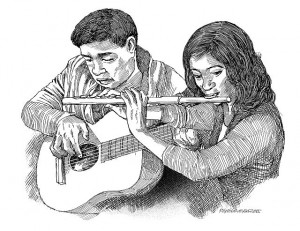
When our host told us that they were husband and wife, I became conscious of the fact that they spoke with their eyes. No song or carol began without him giving her a signal, and her wordlessly agreeing, as to what should come next. Their music spoke of domestic peace, of marital bliss.
“All art constantly aspires towards the condition of music,” wrote Walter Pater. This being so, what better art is there than the art of loving? In the case of the couple, the loving not just aspires towards, but as well takes on, the form of music.
I can imagine them at home. After dinner, instead of him watching a basketball game, or her a soap opera on TV, he probably picks up his guitar, and she her flute. And then, with a slight nod of his head, they begin a duet for flute and guitar, perhaps a Bach piece like “Sleepers Wake, the Voices are Calling,” or “Sheep May Safely Graze.”
But life has its swings. I take it that, like every married couple, they too have their bad days, as likely as not brought on by illness, a business reversal, or that annoyingly recurring thing – a lovers’ quarrel. Days of no music, when the fingers hate the feel of the fretboard and the breath fails to make the pipe yield a note, because their master, the heart, cannot pull itself together.
Now that I think of it, the Holy Family itself had its ruffled times. I know of at least one event when Joseph and Mary were thrown into confusion. Luke narrates that when Jesus was twelve, on one of the their yearly Passover trips to Jerusalem, while on their way home, his parents discovered after a day’s journey that, contrary to what they thought, the boy was not with relatives. They rushed to Jerusalem and after three days’ search found him “in the temple courts, sitting among the teachers, listening to them and asking them questions.” Mary’s pain is palpable in her question, “Child, why have you treated us like this? Look, your father and I have been looking for you anxiously.”
Being perfect, the family life of God – Himself a community (Father, Son and Holy Spirit) – could not be other than on an even keel. But in a way, and I am speaking in human terms, it was “disturbed” – by sin. Which occasioned a demonstration of God’s love, the sending for our sake of the Son to become the least of men and to die the most humiliating of deaths, resulting in his rising from the dead and being glorified, and gaining for us the status of God’s children. Thanks to this, now we cannot define love as other than a self-giving that makes little of suffering, a self-giving so total that it destroys death itself.
And because they vowed, with God’s grace, to love each other with no less than God’s love, the guitarist and flutist – after days and nights of coldness and mental chaos – must have found it in themselves to reconcile. Perhaps this begins with him finally picking up his guitar and giving her a nod. And seeing the signal for what it really is, an offer of peace, she must have removed the flute from its case, and then they begin playing “Sumer Is Icumen In” and the like, with a depth of feeling they had not heretofore known. In other words, they have become better musicians. Pain has given them wisdom, whose music – as Mary did with all that she had learned from the momentary loss of her child – they now treasure in their hearts.
Disclaimer: The comments uploaded on this site do not necessarily represent or reflect the views of management and owner of Cebudailynews. We reserve the right to exclude comments that we deem to be inconsistent with our editorial standards.
